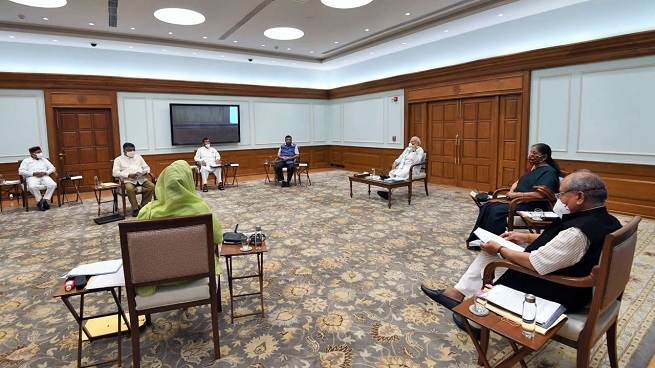Cabinet approves amendment to EC Act
| Date :04-Jun-2020 |

NEW DELHI ;
The amendment to EC Act deregulates food items, including cereals, pulses, onion
THE Union Cabinet on Wednesday approved amendments to the six-and-a-half-decade old Essential Commodities Act to deregulate food items, including cereals, pulses, and onion, a move aimed at transforming the farm sector and raising farmers’ income. The amendment provides for the regulation of food items only under exceptional circumstances like national calamities, famine with a surge in prices. Also, processors and value chain participants are exempted from the stock limit. Announcing the cabinet decision, Agriculture Minister Narendra Singh Tomar said: “Today is a historic day. Three important decisions have been taken that will go a long way in helping farmers while also transforming the agriculture sector.”
The deregulation of commodities under the Essential Commodities (EC) Act is need of the hour and removes fears of private investors of excessive regulatory interference, he said. With the amendment to the Essential Commodities (EC) Act, commodities like cereals, pulses, oilseeds, edible oils, onion and potatoes will be removed from the list of essential commodities, the Government said. Group of Secys to be created The Union Cabinet on Wednesday approved the setting up of an ‘Empowered Group of Secretaries’ (EGoS) and Project Development Cells in ministries and departments to attract investment into India and provide support and facilitation to investors for investing in India. An official statement said that this move is in line with the Government’s target of achieving a $ 5 trillion economy by 2024-25. Chaired by the Cabinet Secretary, the empowered group would include CEO, Niti Aayog, Secretaries of Department for Promotion of Industry and Internal Trade, Department of Commerce, Department of Revenue, Department of Economic Affairs (Member).
Further, the Secretary of the department concerned will be also a member for the respective group. Cabinet okays ordinance to amend IBC law THE Cabinet on Wednesday cleared an ordinance to amend the Insolvency and Bankruptcy Code (IBC) whereby fresh insolvency proceedings will not be initiated for defaults due to the COVID-19 pandemic, according to sources. Payment defaults from March 25 -- the day when the nationwide lockdown to curb coronavirus infections began -- would not be considered for initiating insolvency proceedings for a certain period of time, they said. The sources said the ordinance to amend the IBC has been approved by the Cabinet. Three sections of the Code -- which provides for a market-linked and time-bound resolution process of stressed assets -- would be suspended. The time period would be for six months and not exceeding one year, they added. The sources said an enabling provision has been approved by the Cabinet wherein the Corporate Affairs Ministry can decide about the time period for which the three sections should be suspended. Defaults due to COVID-19 would not be considered for initiating insolvency proceedings.
As a result, companies defaulting on repayment obligations due to disruptions on account of the pandemic would not be pushed into insolvency, they said. According to them, defaults that are not related to the pandemic and applications filed for insolvency before March 25 would be dealt with under the Code. On May 17, Finance and Corporate Affairs Minister Nirmala Sitharaman said the Government would provide various relaxations under the insolvency law, including suspending fresh proceedings for up to one year. “After all, when lockdown gets lifted immediately, you are not sure how much of the businesses will get restored... No fresh insolvency proceedings will be initiated for up to one year,” she had said. Pharmacopoeia Commission merged Aimed at optimal use of infrastructural facilities and resources, the Union Cabinet on Wednesday approved merging of the Pharmacopoeia Commission for Indian Medicine and Homoeopathy with two central laboratories -- Pharmacopoeia Laboratory for Indian Medicine and Homoeopathic Pharmacopoeia Laboratory.
According to an official statement, the cabinet has given its approval to re-establish the Pharmacopoeia Commission for Indian Medicine and Homoeopathy as subordinate office under the Ministry of AYUSH by merging with it the Pharmacopoeia Laboratory for Indian Medicine (PLIM) and Homoeopathic Pharmacopoeia Laboratory (HPL), the two central laboratories established at Ghaziabad since 1975. The merger is aimed at optimising the use of infrastructural facilities, technical manpower and financial resources of the three organisations for enhancing the standardisation outcomes of Ayurveda, Siddha, Unani and Homoeopathy drugs towards their effective regulation and quality control, the statement said. India, Bhutan MoU approved Union Cabinet on Wednesday approved a memorandum of understanding between India and Bhutan for environment protection and cooperation in the areas concerning air quality, waste, chemical management and climate change.
The Union cabinet chaired by Prime Minister Narendra Modi gave its nod for the signing of the MoU which will enable establishment and promotion of closer and long-term cooperation between the two countries in the field of environment protection and management of natural resources on the basis of equity, reciprocity and mutual benefits, taking into account the applicable laws and legal provisions in each country, an official statement said. Kolkata Port renamed after S Mookerjee The Government on Wednesday gave the approval to rename Kolkata Port as Syama Prasad Mookerjee Port. Prime Minister Narendra Modi while addressing the 150th-anniversary programme of Kolkata Port Trust in January had announced rechristening it after Jan Sangh founder Syama Prasad Mookerjee. The Union Cabinet has given its approval to rename Kolkata Port as Syama Prasad Mookerjee Port, a release said.